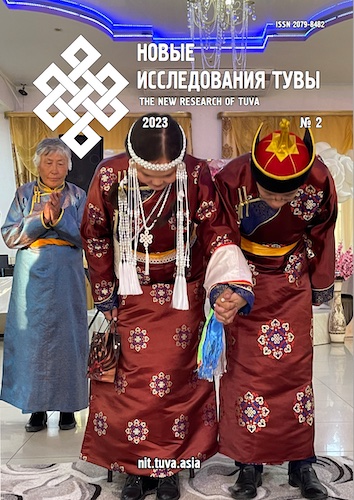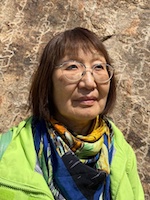Travelogues in the perspective of gender Orientalism (A case study of texts by K. D. Mintslova, E. K. Vereshchagina,
DOI:
https://doi.org/10.25178/nit.2023.2.10Keywords:
travelogue; gender Orientalism; female writer; masculine; coloniality; ethnographic; civilization; savagery; colonial discourse; postcolonial studiesAbstract
The article presents a comparative analysis of travelogues in the postcolonial perspective. The results obtained are considered from the point of view of the theory of gender Orientalism. The materials for the case study comprised the texts written by Sergei R. Mintslov and his wife Kseniya D. Mintslova (“Secret Assignment: A Journey to Uriankhai” and “A Faraway Krai: A Journey through the Uriankhai Land”) dedicated to the joint journey of the married couple to the Uriankhai Krai in 1914 (today known as Tuva), as well as the work of Elizaveta K. Vereshchagina (“Essays about a Journey to the Himalayas”) and a book by Yuri N. (George Nicolas de) Roerich (“Along the Paths of Central Asia”) written during the trans-Himalayan expedition of 1925–1928.
Being considered in the postcolonial aspect, travelogues make it possible to identify new identities and new languages that differ from the colonial language of describing colonized cultures and peoples. The authors define gender Orientalism, according to which the subordinate position of a woman in the masculine Western culture determines the features of Orientalist discourse, where she occupies an intermediate position between the colonizer and the colonized.
Thereupon, the anticolonial aspect of female travelogues is highlighted and a comparison with similar male texts is presented. The ambivalence of the position of female writers is expressed in the features of their feminine writing that is heterotypically enclosed in the masculine discourse of colonialism, but nevertheless able to express an anti-colonial perspective.
References
Ponomarev, E. R. (2020) Postkolonial'naia teoriia i literatura puteshestvii. Vzgliad iz Rossii [Postcolonial theory and travel writing: A View from Russia]. Novoe literaturnoe obozrenie, no. 1 (161) [online] Available at: https://nlobooks.ru/magazines/novoe_literaturnoe_obozrenie/161_nlo_1_2020/article/21988/ (accessed 10.03.2023). (In Russ.).
Said, E. W. (2021) Orientalizm [Orientalism]. Moscow, The Garage Museum of Contemporary Art. 560 p. (In Russ.).
Sergeeva, N. M. and Chetyrova, L. B. (2022) Vizual’naia reprezentatsiia oirat-kalmykov i tuvintsev v kontekste byta v nachale XX veka [Visual representation of the Oirat-Kalmyks and Tuvans in the context of day-to-day life at the beginning of the XX century]. New Research of Tuva, no. 4, pp. 257–275. (In Russ.). DOI: https://doi.org/10.25178/nit.2022.4.19
Foucault, M. (1996) Volia k istine: po tu storonu znaniia, vlasti i seksual'nosti [The will to truth: Beyond knowledge, power and sexuality]. Moscow, Magisterium ; Kastal'. 448 p. (In Russ.).
Shevelev, A. N. (2017) Demidovskie uchebnye zavedeniia dorevoliutsi-onnogo Peterburga (k 170-letiiu so dnia osnovaniia) [Demidov educational institutions in pre-revolutionary Petersburg (The 170th anniversary of their foundation)]. Istoriko-pedagogicheskii zhurnal, no. 1, pp. 27–37. (In Russ.).
Bhabha, H. K. (1994) The location of culture. London; New York, Routledge. xiv, 285 p.
Burton, S. (2014) Travel narrative and the ends of modernity. New York, Cambridge University Press. ix, 255 p.
Clarke, R. (2018) History, memory and trauma in postcolonial travel writing. In: The Cambridge companion to postcolonial travel writing / ed. by R. Clarke. Cambridge, Cambridge University Press. xxxvii, 251 p. Pp. 49–62. DOI: https://doi.org/10.1017/9781316597712.005
Coronil, F. (1995) Transculturation and the politics of theory: Countering the center, Cuban counterpoint. In: Ortiz, F. Cuban counterpoint, tobacco and sugar. Durham, Duke University Press. lxix, 312, xiii p. P. ix–lvi.
Gove, Ph. B. (1961) The imaginary voyage in prose fiction: A history of its criticism and a guide for its study, with an annotated check list of 215 imaginary voyages from 1700 to 1800. London, The Holland Press. xi, 445 p.
Huddart, D. (2008) Postcolonial theory and autobiography. London ; New York, Routledge. vi, 199 p.
Lewis, R. (2003) Gendering orientalism: Race, femininity and representation. London ; New York, Routledge. xiv, 267 p.
Mignolo, W. and Walsh, C. E. (2018) On decoloniality: Concepts, analytics, praxis. Durham, Duke University Press. xii, 291 p.
Mills, S. (1991) Discourses of difference: An analysis of women’s travel writing and colonialism. London ; New York, Routledge. viii, 232 p.
Mukharji, T. N. (1889) A visit to Europe. Calcutta, W. Newman ; London, Edward Stanford. 404 p.
Pratt, M. L. (2008) Imperial eyes: Travel writing and transculturation. 2nd ed. London ; New York, Routledge. xiv, 276 p.
Pyne, L. (2021) Postcards: The rise and fall of the world’s first social network. London, Reaktion Books. 232 p.
Quijano, A. (2007) Coloniality and modernity / rationality. Cultural Studies, vol. 21, issue 2–3, pp. 168–178. DOI: https://doi.org/10.1080/09502380601164353
Rosaldo, R. (1989) Imperialist nostalgia. Representations, vol. 26, pp. 107–122. DOI: https://doi.org/10.2307/2928525
Spivak, G. Ch. (1987) In other worlds: Essays in cultural politics. New York, Methuen. xix, 309 p.
Znamenski, A. A. (2011) Red Shambhala: Magic, prophecy, and geopolitics in the heart of Asia. Wheaton, IL, Quest Books. xxv, 268 p.
Published
How to Cite
For citation:
Chetyrova L. B. and Sakharov A. S. Travelogi v perspektive gendernogo orientalizma (po materialam tekstov K. D. Mintslovoi, E. K. Vereshchaginoi, S. R. Mintslova i Iu. N. Rerikha) [Travelogues in the perspective of gender Orientalism (A case study of texts by K. D. Mintslova, E. K. Vereshchagina, S. R. Mintslov and Yu. N. Roerich)]. New Research of Tuva, 2023, no. 2, pp. 141‑152. (In Russ.). DOI: https://doi.org/10.25178/nit.2023.2.10
Issue
Section

This work is licensed under a Creative Commons Attribution-NonCommercial 4.0 International License.

Author(s) license holder(s) grant rights for their work to the journal (grantee of a license) under the simple non-exclusive open license in accordance with Art. 1286.1 «Open license for a research work, work of literature or fine arts», Civil Code of the Russian Federation.
New Research of Tuva publishes articles under the Creative Commons Attribution-NonCommercial license (CC BY-NC).
Since it is an open license, author(s) reserve the right to upload the article to their institutional repository, submit it to another journal (if it allows republications), or republish it on their own website (in full, or in part).
However, several conditions apply here:
a) The republished version must always contain the name(s) and affiliation(s) of the author(s), the original title and the hyperlink to the original version on the New Research of Tuva website;
b) It must be in open access, free of charge, and no category of readers must be in any way whatsoever advantaged over general readership.
c) should the contribution be submitted elsewhere by its author(s) without substantial modification (30% or more of original text unchanged), the body of the article should contain a disclaimer that the original version was published in New Research of Tuva (with a link to the respective page)
The CC-BY-NC is a non-revocable license which applies worldwide and lasts for the duration of the work’s copyright.










